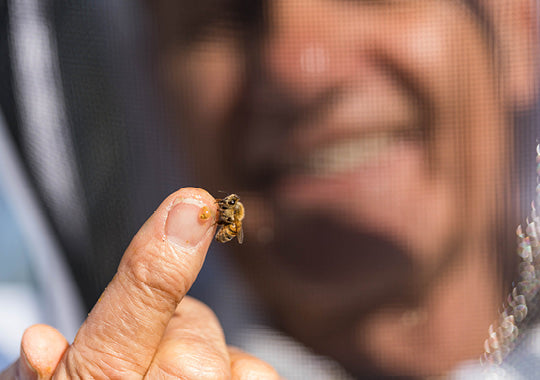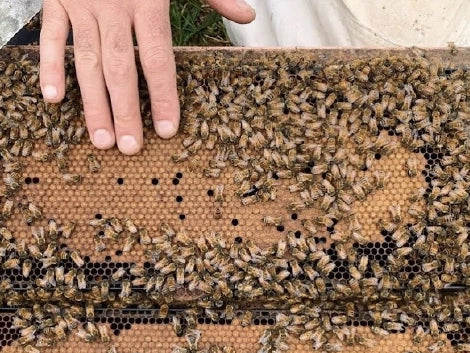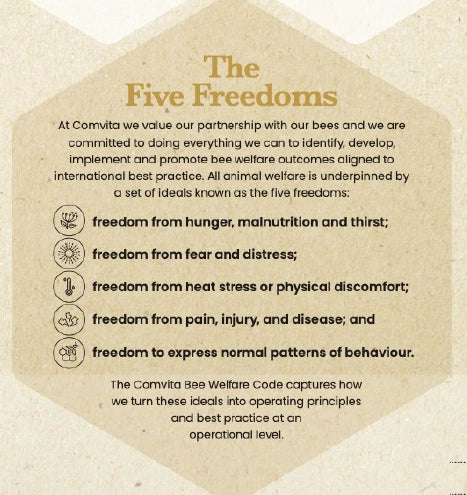Honeybees are at the heart of our work and purpose at Comvita. We are committed to doing our part to not only help them to survive, but to thrive for many generations to come.

Our Commitments
- As beekeepers since 1974, we take our role as Kaitiaki (guardians) of bees seriously. Beyond producing powerful wellness products like UMFᵀᴹ Mānuka Honey and Propolis, we recognise the critical importance that honeybees play in directly pollinating one third of our global food supply and supporting the biodiversity of our ecosystems.
- Bees are essential to the survival and flourishing of our natural environment. Sadly, global bee populations are in decline from the damaging effects of pesticide use, habitat loss, pests and diseases, and climate change. At Comvita, we are driven to help where we can, and we are scaling up our environmental activations as global leaders and educators in bee advocacy and welfare.
How we are tracking:
-
- Since 2021 we have partnered with beekeepers from around the world to rescue and relocate hives. To date we have rescued over 1,200 bee hives, estimated at over 61 million bees.
- As one of New Zealand's largest private native foresters, we have planted over 6.8 million Mānuka seedlings, with planted and managed forests covering 6,045 hectares across the North Island, providing a habitat for bees and nature to thrive.
- We have launched an interactive Bee and Pollinator education programme and have shared this with thousands of primary school students across the country.
-
- Since 2022, all of our beekeepers have committed to Comvita’s Bee Welfare Code, a document that outlines beekeeping best practices to ensure our bees can thrive as naturally as possible in accordance with the five freedoms of animal welfare principles.
- Since 2021 we have been leaders in Glyphosate free standards, ensuring our honey remains as clean and pure as nature intended.
- Comvita's hive mortality rate is considerably lower than New Zealand's industry standard (8.5% vs 12.7%) as reported in the 2023 Colony Loss Survey.
- Since 2022, all of our beekeepers have committed to Comvita’s Bee Welfare Code, a document that outlines beekeeping best practices to ensure our bees can thrive as naturally as possible in accordance with the five freedoms of animal welfare principles.
-
- Our Mānuka forests now house millions of native trees, providing the perfect environment for our honeybees to forage and thrive to create the most powerful Mānuka honey possible. As well as Mānuka, we recognise the importance of ensuring our bees have wide-reaching nectar sources and extensive places to thrive. Companion planting, therefore, forms a key part of how we establish our Mānuka forests. This provides a variety of nectar and pollen sources for the bees. The native trees we plant gives the bees shelter and stabilises the land.
-

Image: Noelani Waters, Comvita’s Bee and Nature Advocacy lead, sharing all about bees with students at Avondale Primary School.
-

Image: At our Bee Experience in Auckland’s Victoria Park, students get a hands-on experience with live bees, to learn how they live and the important role they play in our ecosystem.
Bee Advocacy and Education
We believe that inspiring the next generation to love and advocate for our pollinators is one of the most impactful actions we can take as leading honey producers. This is why we have designed a hands-on and engaging educational programme all about bees and other essential pollinators to share with primary school students across Aotearoa, New Zealand. To date we have shared this programme with over 3,500 public school students and given away over 1,500 packs of pollinator-friendly seeds so that students can share what they have learned with their families and take action to help our bees and pollinators to thrive in their own backyards.
In 2024 we began a partnership with New Zealand non-profit, Garden to Table, which teaches children how to grow, harvest, and prepare their own fresh fruits and vegetables. In late 2024, we made and delivered 3,000 Pollinator Seed Balls and 125 kilograms of Comvita Mānuka honey to 50 North Island schools as part of our partnership with Garden to Table.

Bee Rescue
By partnering with other like-minded and experienced beekeepers, we aim to safely relocate hives that have found their way into unwelcome areas and rescue bees from extermination.
From 2021 to 2024 we rescued 1,234 hives through partnerships with beekeepers in NZ, USA, and Singapore. We know that a hive has about 50,000 bees so that’s over 61,700,000 bees!

Protecting Bee Populations
OUR BEE WELFARE CODE
Bee Welfare is a vital issue for us all globally, given the importance of their role in the ecosystem and food production.
The New Zealand industry mortality rates for bees were at 12.7% for 2023. In some parts of the world this is above 50%. At Comvita, we are tracking with considerably fewer losses (8.5%) over the same period, reflecting the quality and know-how of our world-class team of beekeepers.
We believe beekeeping is inherently good and sustainable. We see our relationships with bees as a partnership rather than exploitation. Our honeybees depend on us, and we have the ability to contribute greatly to their quality of life, as they do ours.
Built on our own ethical beekeeping standards, we are led to inspire others in the apiculture industry through the design of our Bee Welfare Code, aligned to the internationally recognised 'five freedoms of animal welfare'. Collaborating with industry partners and Apiculture NZ, we seek to fill gaps in research and keep up with new science to improve bee welfare, treatment, hive placement and hive dispersion to avoid overcrowding. This will help ensure healthier and growing bee populations.
-

Varroa Destructor
Industry knowledge suggests that the leading cause of colony loss is due to varroa mite numbers building up in hives. So, we are fighting back against varroa destructor! Varroa destructor is a parasitic mite that infests honeybee colonies, vectoring diseases and weakening the immune system of the hive.
Comvita continues to refine and execute a comprehensive varroa management program based on several key initiatives. In addition to our regular hive inspection including data collection, reporting and analysis of varroa levels and its impact on hive health through an Integrated Pest Management (IPM) approach, we also integrate organic varroa control into our annual spring and autumn treatment periods.
We are investing in research to reach long term sustainability. This includes selecting honeybee populations that exhibit traits in which hives naturally manage mite infestation levels without treatments. Initial research findings have identified the presence of this hygienic behaviour specifically targeting varroa (VSH, Varroa-sensitive hygiene) in existing Comvita bee colonies which opens the opportunity to initiate selective breeding to foster this beneficial behavior.
-

Glyphosate Free
Glyphosate has become a hot topic in food quality in recent years, but it's been around since the 1970s. Today, many countries use it as a weed killer and crop desiccant. It's a chemical that we certainly don't think belongs in food, including honey.
Bees, who pollinate crops in addition to flowering plants and trees, are also subject to consuming glyphosate when foraging for nectar. So, not only is this chemical introduced to the environment, but it also affects bees and other insects, animals, humans, and water quality.
We are proud to say that, since 2021, we have been a certified Glyphosate free company in the EU and US. We take extra precautions by placing our hives in locations far from agricultural farms that may pose a potential risk, to minimise the chance that our bees may have unintended exposure to glyphosate.
To double check our honey isn't at risk for this contaminant, we test for the presence of glyphosate in every single batch of honey. We exceed the strict standards set by the EU which is the most stringent among global regions. Any batch of honey that may have been inadvertently contaminated with glyphosate can be traced back to the precise hive location so that corrective action can be taken to ensure the purity of our next batch.
 is here! Shop now, pay later in 4 easy installments
is here! Shop now, pay later in 4 easy installments



